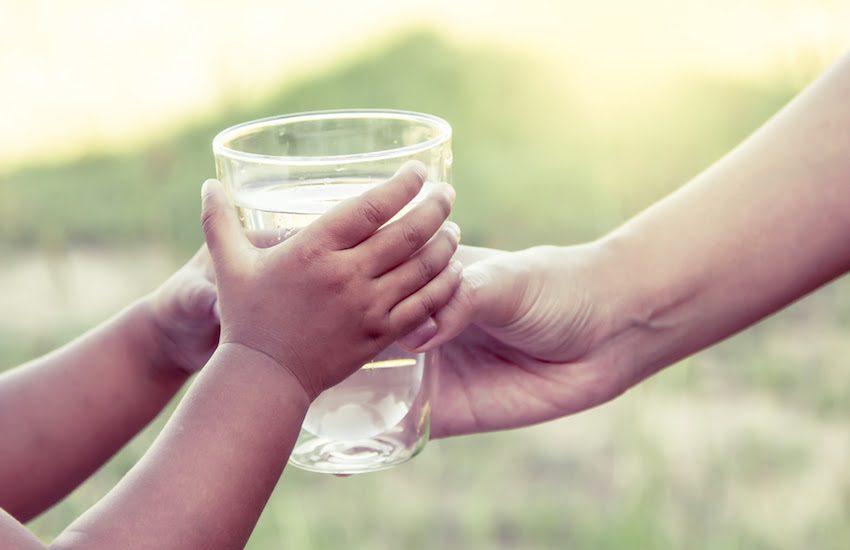How many times have you heard the advice to drink more water?
Your mom tells you. Your doctor tells you. You read articles everywhere touting the benefits of drinking at least eight glasses of water per day. “You’ll lose weight! You’ll boost your energy! You’ll have glowing skin, shinier hair, fewer headaches!” And the list goes on.
So you increase your water intake with the goal of improving your health. You keep a gallon water jug nearby, use an app to track how many glasses you’ve finished, and even set up reminders on your phone.
But after a month or so, your habit of drinking more water ends. The taste of plain water doesn’t excite you. Your busy schedule keeps you from worrying about that lingering feeling of thirst. And all those bathroom visits are driving you crazy.
You begin to wonder if there’s something wrong with you. Why aren’t you experiencing all the fantastic benefits of drinking water everyone is talking about?
Well, maybe you haven’t given it enough time. Or maybe you’re making a few mistakes in your attempts to stay hydrated.
According to Ayurveda, one of the world’s oldest healing systems, there are six principles for something you might have thought had no method: drinking water properly.
1. Sip, Don’t Chug
Growing up, I saw a huge difference between how my grandfather drank water and how the following generation of my parents drank water. Whenever I was spending the summer at my grandparents’ place, my grandpa would suggest that I sit down and sip water instead of drinking it all at once. In fact, I never saw my grandpa hurriedly chugging his water while standing up.
Drinking your water all at once causes it to flush through your system faster and can, paradoxically, lead to dehydration. The inside of your body is a delicate, well-controlled environment. Therefore, any fluid you consume beyond what your body needs to stay hydrated winds up in your bladder.
2. Drink Lukewarm Water
In olden times, people used to quench their thirst by drinking clay pot water. Sipping that earthy water was a ritual in itself. But with refrigeration and bottled water taking over, out went this healthy practice.
According to Ayurveda, cold drinks extinguish the heat of the “digestive fire” and promote the buildup of toxins that develop as a by-product of poor digestion. Cold water clashes with the overall body warmth and energy, causing distress in the tissues and blood vessels. Sipping warm water, on the other hand, improves digestion by stimulating the natural digestive enzymes and improving circulation.
3. Start Your Day with a Glass of Water
It has long been known that drinking water first thing in the morning purifies the body’s internal systems. This practice, known “early morning water treatment,” originates from ancient Ayurvedic medicine as well.
Drinking at least 16 ounces (500 millilitres) of warm water on an empty stomach re-hydrates the body after eight hours of sleep, jump-starts your metabolism, and helps to flush out the toxins your body packaged up over night. Some of this water might not be absorbed, but that’s okay. The main reason for drinking so much water at once is to cleanse the colon and enable your body to absorb new nutrients from food.
4. Avoid Having Water with Meals
Drinking while eating is such a common practice that restaurants don’t even ask if you’ll have anything to drink but what they should serve you. Often they bring you a glass of iced water even before you order anything.
It seems that we have forgotten the natural way of drinking water. Beverages with meals would never be used if we took the time to thoroughly chew our food. Our saliva is the first step to digestion. It contains enzymes to help break down food and stimulate the stomach to release digestive enzymes. When you drink water with your meal, your saliva and digestive enzymes get diluted, and digestion becomes that much more difficult.
The best practice is to avoid water 30 minutes before your meal and a minimum of two hours after your meal.
5. Jazz Up Your Water to Increase Absorption
Natural health experts recommend drinking half your body weight in ounces of water per day. However, more important than how much water you drink is the amount of water that actually makes it to your cells. If you find yourself making frequent trips to the bathroom, you’re probably not absorbing much.
Rather than drinking copious amounts of water, you can reduce your water intake and still stay hydrated simply by adding a pinch of unrefined mineralized salt (such as Pink Himalayan salt) to every glass of water. Pink Himalayan salt contains 84 minerals and elements, and plenty of electrolytes, which effectively regulate the water content within your body.
6. Listen to Your Body’s Cues for Thirst
Ayurveda has a simple principle – listen to your body’s subtle signals and drink whenever you feel thirsty. You don’t need to calculate how much air you need to breathe each day. Your body does all the thinking for you. When you start paying attention to your thirst cues and sip warm water throughout the day, you’ll drink the right amount.
That being said, if you continuously suppress your natural thirst, your body can become desensitized and you might “forget” to drink. That’s when you need to look for secondary tell-tale signs of dehydration, such as dryness (skin, lips, hair), inflammation (skin rashes), dark-colored urine, and constipation.
The Art of Drinking Water
Ayurvedic medicine is ancient, yet timeless. Some of its practices might seem simple or perhaps even obvious, but their benefits have been proven over centuries of use. As you start to form proper drinking habits, you’ll experience all those benefits yourself. Whether you want to lose weight or have more energy, glowing skin, shinier hair, or a healthier body, start with proper water intake.
reshared from foodmatters.com

